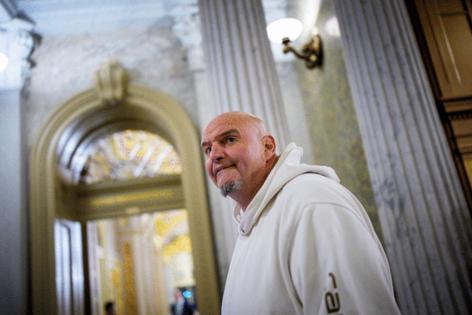What to know about ventricular fibrillation, the heart condition that sent Sen. John Fetterman to the hospital
Published in News & Features
Ventricular fibrillation appears to be a newly identified diagnosis among Sen. John Fetterman’s ongoing medical issues, disclosed after a fall on Thursday sent the Pennsylvania Democrat to the hospital.
The condition is the most severe form of arrhythmia and a common cause of sudden cardiac death. His outcome could have been helped by the defibrillator that Fetterman had implanted after a stroke during his 2022 election campaign, according to doctors specializing in heart conditions who were not involved in his care.
Fetterman’s spokesperson said in a statement he was doing well and undergoing routine observation at the hospital.
Fetterman has previously disclosed that he has cardiomyopathy, a major risk factor for ventricular fibrillation. As treatment following his stroke, he had a pacemaker and defibrillator inserted.
Ventricular fibrillation is a far more serious condition than atrial fibrillation, which Fetterman was previously diagnosed with.
Ventricular fibrillation’s most common symptoms are collapsing and a loss of consciousness, according to the Mayo Clinic, because of a lack of blood flow to the brain.
During an episode, the lower parts of the heart quiver or twitch ineffectively instead of pumping blood. As a result, blood fails to make it to the rest of the body. This can quickly become deadly if left unattended for minutes.
Fetterman became lightheaded and fell while on an early morning walk, according to a statement from a spokesperson. He hit his face and suffered minor injuries.
The incident was caused by a “ventricular fibrillation flare-up,” according to the statement. The information provided did not say whether it triggered his defibrillator to provide a shock to his heart that can be life-saving in such events.
Fetterman also did not say whether he lost consciousness. Doctors said that would be a sign that the episode was more serious.
Without treatment, ventricular fibrillation can rapidly lead to sudden cardiac arrest. In fact, some doctors will use the terms interchangeably, said Joshua Cooper, the director of cardiac electrophysiology at Temple University Hospital in North Philadelphia.
“Ventricular fibrillation is the worst rhythm that can happen because it basically renders the heart completely unable to pump blood. There’s no worse rhythm than that,” he said.
In rare cases, ventricular fibrillations are brief and stop on their own. But often these episodes are more sustained and need to be treated with a shock to the heart, which a defibrillator provides, said Christian Ruff, the director of general cardiology at Brigham and Women’s Hospital in Boston and an associate professor of medicine at Harvard Medical School.
“It’s important to underscore that it can be life-threatening and fatal. It’s a serious thing that happened,” Ruff said. “It’s not unexpected — which is why we put defibrillators in patients with cardiomyopathy.”
Fetterman is now known to have conditions sometimes called V-fib and A-fib for short. These both involve a malfunctioning of the electrical signals that control the beating of the heart, the way a conductor guides an orchestra. When those signals go haywire, arrhythmia, or an irregular heartbeat, occurs.
In contrast to ventricular fibrillation, which affects the bottom parts of the heart, atrial fibrillation is a condition in which the upper parts of the heart beat rapidly in a chaotic manner. It can lead to blood clots in the heart and increase the risk of stroke and heart failure.
A 2014 study showed that people with atrial fibrillation are at a three times higher risk of having ventricular fibrillation.
Most people who survive ventricular fibrillation, and many who are at risk for experiencing it, receive an implantable cardioverter defibrillator, or ICD, which spots arrhythmias and sends electric shocks when needed to restore a normal rhythm.
Atrial fibrillation alone is not typically treated with a defibrillator designed to treat conditions that could lead to sudden cardiac arrest. After facing questions over his initial medical disclosures after his stroke, Fetterman later disclosed his cardiomyopathy.
About one in 10 patients who receive an ICD as a preventive measure will experience an episode of ventricular fibrillation where the ICD shocks the heart back into a normal rhythm, said Cooper.
“Cardiomyopathy means the bottom chambers (of the heart) are weak or scarred in some way. Fetterman’s doctors must have felt he was at risk for ventricular fibrillation,” Cooper said. “And apparently, they were right.”
It’s crucial, he said, for patients experiencing ventricular fibrillation to be treated quickly, whether with an ICD or one of the portable defibrillators that are kept on hand in many public spaces.
“It’s a 100% treatable event if someone is shocked promptly,” Cooper said.
(Inquirer staff writer Julia Terruso contributed to this article.)
©2025 The Philadelphia Inquirer. Visit inquirer.com. Distributed by Tribune Content Agency, LLC.







Comments